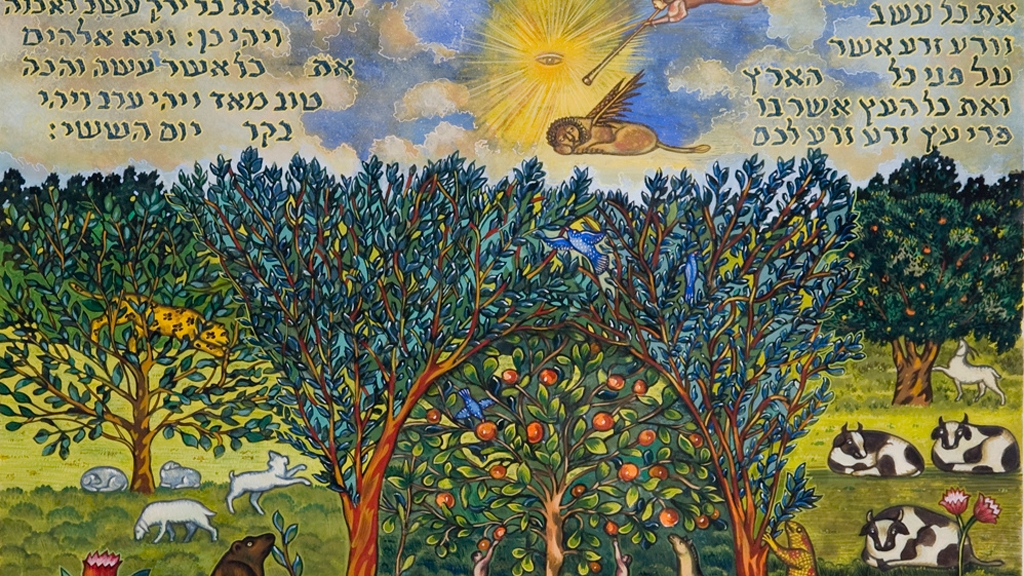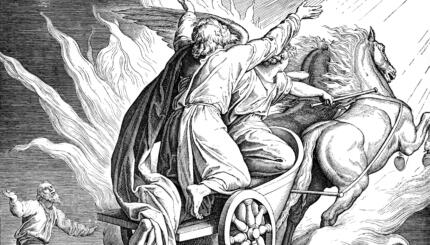Commentary on Parashat Sh'lach, Numbers 13:1-15:41
Our world abounds with mistreatment of the earth. From climate change and ozone layer depletion to urban sprawl and water pollution, our misuse of resources is stunning. But should we be surprised, when ‘Western’ culture seems so heavily invested in the delusion that personal fulfillment can come from just one more wide-screen TV or SUV?
The good news is that the portion of Sh’lach not only gives us the deepest of understanding of what is happening, but also points to how we can get out of this mess! We must start by taking a step back from these specific ills and look at their underlying cause: mankind’s devastating misunderstanding of the nature of the world itself.
Coming into the Land
Parashat Sh’lach centers around the idea of coming into the Promised Land. Spies are sent ahead of the Children of Israel to preview the land which has been promised as our eternal inheritance. Ten of the twelve spies bring back terrifying reports of a cruel land of undefeatable enemies (Numbers 13:27-29). Only two spies, Caleb and Joshua, come back with a different report: “No,” they tell us, “The land is not what you think.” They tell us that the land is not only “very good” but is very, very good — tov meod meod (Numbers 14:17).
In order to unpack this statement, we must consider the greater meaning of coming into the land. On one hand, the portion is speaking literally about the land of Israel, the expanse of territory that the Jews will inherit.

Help us keep Jewish knowledge accessible to millions of people around the world.
Your donation to My Jewish Learning fuels endless journeys of Jewish discovery. With your help, My Jewish Learning can continue to provide nonstop opportunities for learning, connection and growth.
In a larger sense, however, the act of “coming into the land” refers to something that transcends spatial boundaries. Our role in the world is to fulfill our true human potential, to recognize, and thus to reveal the glory of God’s creation. For the whole land is full of God’s glory; ‘Melo Kol Ha‘Aretz Kevodo.‘
Remember that the Hebrew word for reveal, Galeh, shares the same essential root letters as the word Geulah, meaning deliverance. The word geulah carries many shades of meaning. Chief among them is the idea of “redemption from exile,” both physically (returning to the Holy Land from foreign exile) and spiritually (the removal of our blindness so that we can see God’s radiance). Our role in revealing (Galeh) the true wonder and majesty of God’s creation is thus linked inextricably with our physical deliverance (Geulah).
Too often we ignore this essential truth. This is the same mistake made by the 10 negative spies in Sh’lach. They failed to see the goodness in the land, and adopted the attitude that the World (i.e. the land) was essentially bad. They, like us, could have fulfilled their true potential in the world and seen its beauty, but instead made a mockery of it: “We’ll never make it,” they wailed (Numbers 14:10), “Let’s just give up, and go back to Egypt!”
The consequence of this attitude, for the spies, was their downfall. The consequence for us is the wanton environmental destruction we see around us. If we don’t see the world as being good, what motivation do we have to want to protect it?
Promise of Fulfillment
Furthermore, the kind of behavior advocated by today’s widespread “consume-your-worries-away” mentality stems from yeush, despair, which says: “If there is a true meaning of the world, we will never know it; and maybe there isn’t one at all! Maybe the world is only inert matter that exists to be exploited for our fleeting satisfaction.”
But the belies this attitude. After the catastrophe of the spies, the whole generation is banished to die in the wilderness for their inability to grasp the true nature of the world. Suddenly, the Torah leaps to a new topic: how the temple offerings should be made when we enter the land.
In other words, although we may err, despair, fail, and have no idea how we are to set things right, the ultimate promise of fulfillment is not withdrawn. The ultimate nature of reality, the Torah affirms, is one of joy, celebration, and gratitude. Fulfillment waits for us to wake up and live up to our potential, as knowers of God, and recognizers of the true wondrous nature of God’s world.
Back to Creation
On the sixth day of the creation of the world, God says of the completed work of Creation (Genesis 1:31), “Very good.” To the positive spies, the land was not just ‘very good’ but was ‘very very good.’ The Torah is hinting to us that in some way, the fulfillment coming from our “entering into the land,” in every sense, is better, richer, and deeper than the fulfillment that God experienced when he looked out on the new, pristine creation.
The Sforno tells us that the sixth day of creation is called “very good,” instead of simply “good,” like all the other days, because it is the tachlit, the completion and coming to fruition of all the other details that came into being before it.
But this fruition is not the final fruition. What it lacks is experiential knowledge. When the world was created, we hadn’t eaten from the forbidden fruit or built the Golden Calf, let alone caused the Temple to fall or pumped toxic waste into our waterways. It is only as creation stumbles and staggers to its maturity and we gain for ourselves, experientially, the knowledge that Caleb and Joshua had: the world is indeed very, very good.
Sforno also explains why the 10 negative spies failed to recognize the land for what it was. The Torah tells us that all of the spies walked the length and breadth of the barren Negev to Hebron, where only Caleb visited and supplicated at the Cave of Mahpelah, the burial place of Adam and Eve, Sarah and Abraham, Isaac and Rebecca, and Jacob and Leah.
The 10 negative spies did not recognize the significance of this place. Their report is like the attitude of a person who looks only at the shell of the world, its outer nature, without stopping to see what is buried underneath. Such a person blunders through life without looking outside of his/her box, just following the behavior of those around them.
They try to wash down their underlying unease at the barrenness they see with careless over-consumption and mistreatment of the earth’s resources, without stopping to ask, “What is this place, really? Why am I here? What have I been longing for all along?”
Caleb, on the other hand, did recognize the deeper significance of what was before him. His and Joshua’s positive reports are the words of those who looked into the world and saw not the terrifying giants that are before them, but the inner nature and beauty of the world back to the original source of Creation.
Finding the Divine
This is what Rebbe Nachman means when he states, in Lekute Mohoran, that we must look for the innate Divine wisdom and radiance that lies at the heart of, and animates, every tiny piece of the created world.
The hidden message in the words of Caleb and Joshua might just be the answer to today’s environmental woes. If we could only realize and recognize that inner nature of the world like the positive spies, we would be naturally, irresistibly compelled to live our lives in a way that respected God’s creation, especially treating with love and awe the natural resources we have the privilege of using.
As said earlier, the juxtaposition of the story of the spies and the instruction for the sacrifices reminds us not to despair at what we have done so far to the planet. Although the damage we have done requires bigger and more urgent solutions each day, it is never too late for us to wake up. It is never too late to change our behaviors, both personally and nationally.
Humanity’s lack of understanding of its role in the world and its relationship to God is at the core of the problems facing our planet. Like the spies, all that is required of us is to recognize and internalize that God’s creation is indeed very very good.
Provided by special arrangement with Canfei Nesharim. To learn more, visit www.canfeinesharim.org.



